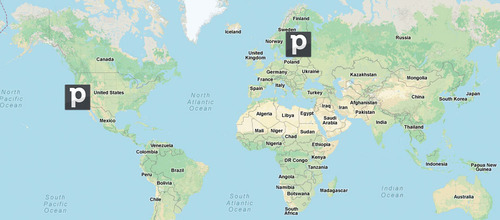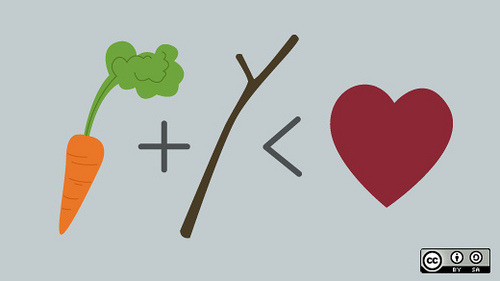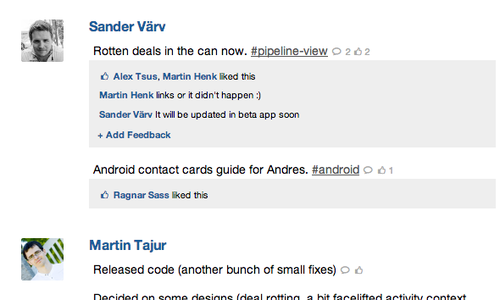While it’s tough enough to get into good personal habits, how do you get your employees to adopt good company habits?
Changing your behavior starts with an intention, and when you’re herding multiple human intentions, that transformation process can become tricky.
Pipedrive, a startup that makes a simple CRM that people actually like to use, is one of our oldest team customers. As the company grew rapidly, from six to twenty people within a year, overall iDoneThis usage flagged because new people weren’t getting on board. Pipedrive found a way to turn that behavior around, hacking the iDoneThis company habit with great success.
A bad habit arises

Split between San Francisco and Talinn, Estonia, Pipedrive started using iDoneThis to address the challenge of working together across the globe. “It’s been incredibly useful,” says Martin Henk, co-founder and head of customer support. “Keeping track of everyone with the ten-hour difference is pretty huge. We wouldn’t know half of the things people are doing without iDoneThis.”
But capturing the full advantage of that knowledge and conversation about what people are working on relies on full participation. A core group had continued to use iDoneThis regularly, but new people, says Martin, didn’t seem to understand the value of the tool or ever get comfortable with how to record their accomplishments, ignoring their iDoneThis emails.
Changing the habit
Since the founders had seen first-hand the benefits of using iDoneThis, they wanted to fix this problem of team buy-in. Merely telling people to do it failed to catch on. The next idea floated was administering some kind of punishment, but the founders instinctively knew that threats would not only be ineffective but damaging. “Luckily we didn’t go through with it,” Martin recounts. “We couldn’t figure out a way to do it that would end well.”
Ragnar Sass, co-founder and head of partnerships & HR, then proposed counting the number of dones and likes and rewarding the person with the most activity with a small prize, like flowers or a gift card. “I can’t believe how well this worked,” Martin reports, still sounding surprised. “In hindsight, it’s logical that positive reinforcement works, but it worked incredibly well. Now there’s so much interaction going on in iDoneThis.
“It sticks when you get into the habit.”
The positivity effect
Now that the whole team is on board with the tool, Martin says, “I can rest assured that the entire team knows what someone’s doing.”
The positive prize method has had lasting effects. People who had, just a few months ago, filled out iDoneThis on some haphazard, even monthly basis, became some of the most active users. Likes and comments have gone up six-fold. The support team started recording and celebrating impressive numbers of support cases completed in a day. An “iDoneThis report” has become a core part of the monthly all-hands team meeting.
Newcomers can quickly make sense of what coworkers do and grasp that feeling of being in the same boat, one of the hardest challenges of distributed and split teams. For example, people could immediately connect with a recently hired designer and his work and vice versa. Martin observes, “It’s rewarding for him to know that other people know what he’s doing and actually give feedback right away. So he’s not feeling alone in a new company.”
Pipedrive’s success with this company habit hack was critical for a company that found it difficult to even see each other online. What has been so surprising to Martin and the other founders is how a thoughtful change led to richer conversation and connection.
“People are actually commenting and having a discussion there.” He explains, “Otherwise something like that would be drowned in a Skype chat. The time zone difference doesn’t matter as much. You can have a conversation that’s happening every ten hours but it still gets done.
“It’s funny. So many apps now have likes and comments, but not every app actually has a reason for having them. But in iDoneThis, it’s essential, especially with the time zone difference.”
Why Pipedrive’s company habit hack worked
Dangling goodies like money or looming with threats is not effective. On the contrary, people do their best when motivation comes from within, when they simply want to. According to notable psychologists, Edward Deci and Richard Ryan, people are naturally and deeply driven by needs for autonomy, competence, and relatedness.

Photo: opensourceway
At first glance, Pipedrive’s habit hack of giving out a prize seems to undermine intrinsic motivation and self-determination theory. The monthly prize looks like an “if-then” motivator — do this, then get that carrot or stick — which Daniel Pink has written about in his book Drive. He describes how such extrinsic motivators fail because they focus attention away from the work itself. According to Pink, if-then motivators work fine for routine tasks, but “even with routine work, people are going to work even better if you … let them know why they’re doing it.”
Yet iDoneThis not merely an empty, routine task, nor is Pipedrive’s prize a focus of attention. A small token like a bouquet of flowers is not exactly a brass ring. Instead, it acted more like a trigger, easing the path for new employees figure out for themselves what iDoneThis was all about — to find their own meaning and value in the product.
“The coolest thing about this was the fact that we didn’t have a lecture in a meeting about iDoneThis being really important. Everyone got it by the hint of the subtle award.” Martin describes the extent of the change, “The number of dones and likes are one thing, but the feeling and fun comments are completely different.”
Pipedrive’s habit hack worked because the company approached the behavior change with positivity and a light touch, and because iDoneThis is a tool that aims to blends routine and purpose into a ritual that both builds and is built out of meaning based on hard work and interactions with each other. There: autonomy, competence, relatedness.

